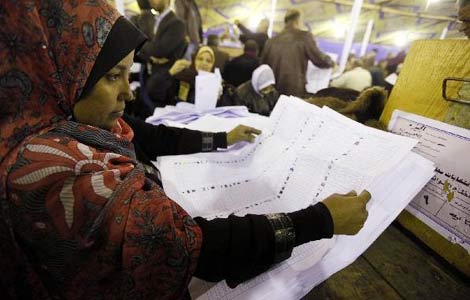Country Report on China's Participation in Greater Mekong Subregion Cooperation
Updated: 2011-12-16 20:11
(Xinhua)
|
|||||||||||
10. Drug Prohibition and Crop Substitution
Over the years, under the GMS Narcotic Drug Control Mechanism (MOU) and bilateral memorandums of understanding and agreements on narcotic drug control, China has engaged in multilateral and bilateral drug prohibition cooperation with the other GMS countries. Through mutual visits, annual meetings on bilateral cooperation on drug prohibition, joint law enforcement, provision of training for drug control personnel (accumulatively holding 24 sessions and training 740 persons from Vietnam, Laos, Myanmar and Cambodia) and assistance in kind, China has intensified cooperation with the other GMS countries in drug prohibition and made positive contribution to improving the drug abuse situation, maintaining social stability, and improving people's lives in GMS countries.
In recent years, China has vigorously pursued the strategy of "Eliminating Drug Sources from Outside the Borders", and by allowing the import of the products of crop substitution and providing special funding, encouraged and supported domestic enterprises to undertake poppy crop substitution and develop substitute industries in Myanmar and Laos. By 2010, more than 180 Chinese enterprises had engaged in poppy crop substitution in Myanmar and Laos, with an accumulative farming area of 210,000 hectares (120,000 hectares in Myanmar and 90,000 hectares in Laos) and involving 47 substitute crops, including rubber, sugar cane, rice, corn, and fruits. The crop substitution projects have created jobs for local residents, encouraged a lot of opium farmers to abandon poppy planting, and effectively elevated the living standards of local people. Chinese enterprises engaging in crop substitution have also built roads, bridges and canals in northern Myanmar and Laos, and thus contributed to the improvement of local infrastructure.
11. Science and Technology
The Chinese government has attached much importance to science and technology exchanges and cooperation under the GMS framework. For many years, in line with the multilateral and bilateral agreements and memorandums of understanding between GMS countries on science and technology cooperation, and in light of the needs of various GMS countries, China has further advanced and enhanced bilateral and multilateral cooperation with the other GMS countries in this field, by jointly conducting science and technology exchange projects, holding training programs, hosting academic seminars, and donating research equipment. Since 2008, under bilateral cooperation frameworks, the Chinese science and technology authority has cooperated with its Thai and Vietnamese counterparts to support and implement 37 short-term exchange projects and 36 long-term cooperative research programs. From 2008 to 2010, China held annual science and technology training programs for the other GMS countries. A total of 368 trainees participated in 81 courses on such subjects as agriculture, resources and the environment, information technology, biomedicine, engineering and machinery manufacturing. Besides, China's Ministry of Science and Technology (MOST) has provided annual training for the science and technology administrative officials of its Vietnamese counterpart. Between 2008 and 2011, a total of 113 science and technology officials from the local and central governments of Vietnam received such training. In the past three years, the MOST has held three annual science and technology seminars of GMS countries to exchange experience in technology transfer and the formulation of science and technology polices and strategies. In 2009, China donated 500,000 RMB yuan worth of research equipment to Myanmar to support local scientific and technological development.
IV. Participation of China's Yunnan Province and Guangxi Zhuang Autonomous Region in GMS Cooperation
Yunnan Province and Guangxi Zhuang Autonomous Region (Guangxi for short), located in the southwest frontier of China and bordering on Myanmar, Laos and Vietnam, are important gateways to Southeast Asia and South Asia, and are at the front line of China's participation in GMS cooperation. They cover an area of 637,070 square kilometers and have a combined population of 97.55 million. In 2010, Yunnan and Guangxi together realized a GDP of 1.67225 trillion RMB yuan, of which Yunnan accounted for 722.01 billion RMB yuan, up by 26.8% over 2008, and Guangxi 950.24 billion RMB yuan, up by 35.3% over 2008. In the same year, the two provinces registered a total export and import volume of 31.08 US billion dollars, up by 36.1% over 2008, of which 8.83 billion dollars were with the other GMS countries, up by 60% over 2008.
Yunnan Province has 15 ethnic minority groups who live across the border between Yunnan and the neighboring countries, and Guangxi is the autonomous region with the largest ethnic minority population in China. The two provinces enjoy ethnic harmony, amicable ties with the neighboring countries and close trade, economic and cultural ties with the other GMS countries. The other GMS countries are the key markets for Yunnan enterprises to explore and take part in international cooperation in sectors where they have competitive advantages, including hydropower, minerals, agriculture and tourism. They are also important partners for Guangxi in a series of key cooperation projects in such sectors as transportation, energy, tourism, and agriculture. The cooperation and exchanges between the two provinces and the other GMS countries in the fields of environmental protection, health, human resources development, and culture and arts have been dynamic. With a view of realizing common prosperity and affluence with its neighbors, China has always placed emphasis on the development and opening-up of its frontier regions. The 12th Five-Year Plan states clearly that Guangxi will be turned into a higher platform for China's cooperation with ASEAN, Yunnan will serve as a gateway for China's effort to open up toward the southwestern , and central Yunnan and the Beibu Bay Region of Guangxi have been listed as economic regions for priority development. These major policy measures will inject fresh vigor and vitality into the Greater Mekong Subregion, the two provinces included, and at the same time help deepen the two provinces' participation in GMS cooperation.
Thanks to the support and guidance of China's central government, the cooperative relations between the two provinces and the related regions of the other GMS countries have been deepened since the third GMS summit. The cooperation mechanisms, including "the Yunnan-Northern Laos Working Team", "the Yunnan-Northern Thai Working Team", "the Economic Consultative Conference between Yunnan and the Four Provinces and Cities of Vietnam", "the Joint Working Team of Yunnan and the Four Border Provinces of Vietnam", and "the Joint Working Committee of Guangxi and the Four Border Provinces of Vietnam", have functioned well, and cooperation in all fields has made steady progress.
Hot Topics
HIV/AIDS, Egypt protest, Thanksgiving, climate change, global economic recovery, home prices, high-speed railways, school bus safety, Libya situation, Weekly photos
Editor's Picks

|

|

|

|

|

|







